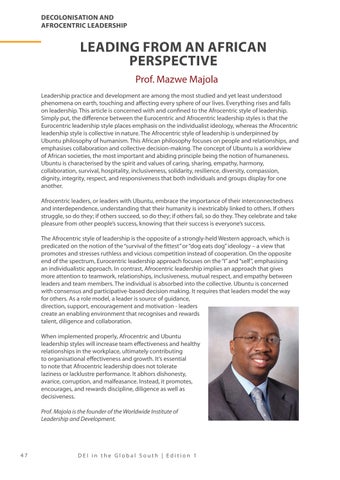DECOLONISATION AND AFROCENTRIC LEADERSHIP
LEADING FROM AN AFRICAN PERSPECTIVE Prof. Mazwe Majola Leadership practice and development are among the most studied and yet least understood phenomena on earth, touching and affecting every sphere of our lives. Everything rises and falls on leadership. This article is concerned with and confined to the Afrocentric style of leadership. Simply put, the difference between the Eurocentric and Afrocentric leadership styles is that the Eurocentric leadership style places emphasis on the individualist ideology, whereas the Afrocentric leadership style is collective in nature. The Afrocentric style of leadership is underpinned by Ubuntu philosophy of humanism. This African philosophy focuses on people and relationships, and emphasises collaboration and collective decision-making. The concept of Ubuntu is a worldview of African societies, the most important and abiding principle being the notion of humaneness. Ubuntu is characterised by the spirit and values of caring, sharing, empathy, harmony, collaboration, survival, hospitality, inclusiveness, solidarity, resilience, diversity, compassion, dignity, integrity, respect, and responsiveness that both individuals and groups display for one another. Afrocentric leaders, or leaders with Ubuntu, embrace the importance of their interconnectedness and interdependence, understanding that their humanity is inextricably linked to others. If others struggle, so do they; if others succeed, so do they; if others fail, so do they. They celebrate and take pleasure from other people’s success, knowing that their success is everyone’s success. The Afrocentric style of leadership is the opposite of a strongly-held Western approach, which is predicated on the notion of the “survival of the fittest” or “dog eats dog” ideology – a view that promotes and stresses ruthless and vicious competition instead of cooperation. On the opposite end of the spectrum, Eurocentric leadership approach focuses on the “I” and “self”, emphasising an individualistic approach. In contrast, Afrocentric leadership implies an approach that gives more attention to teamwork, relationships, inclusiveness, mutual respect, and empathy between leaders and team members. The individual is absorbed into the collective. Ubuntu is concerned with consensus and participative-based decision making. It requires that leaders model the way for others. As a role model, a leader is source of guidance, direction, support, encouragement and motivation - leaders create an enabling environment that recognises and rewards talent, diligence and collaboration. When implemented properly, Afrocentric and Ubuntu leadership styles will increase team effectiveness and healthy relationships in the workplace, ultimately contributing to organisational effectiveness and growth. It’s essential to note that Afrocentric leadership does not tolerate laziness or lacklustre performance. It abhors dishonesty, avarice, corruption, and malfeasance. Instead, it promotes, encourages, and rewards discipline, diligence as well as decisiveness. Prof. Majola is the founder of the Worldwide Institute of Leadership and Development.
47
DEI in the Global South | Edition 1



































